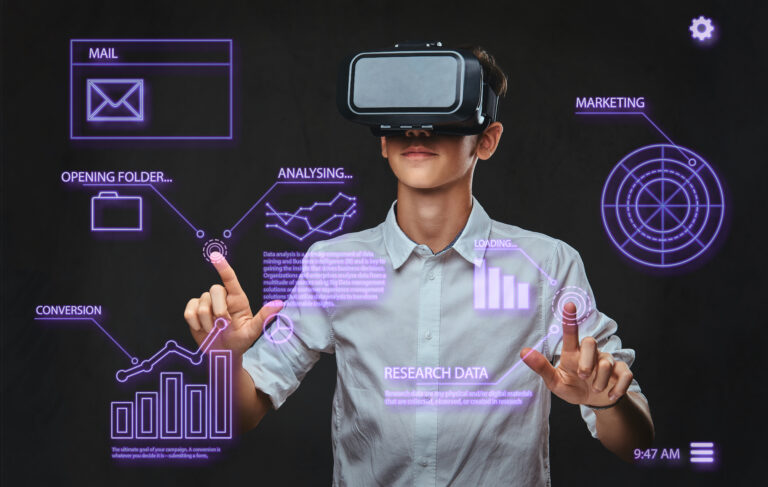Artificial Intelligence (AI) is undoubtedly one of the most impactful innovations of recent times. However, behind all the enthusiasm and promises of a revolutionary future, there are several myths that confuse, alarm and, at times, misinform the public. If you have ever wondered what is truth and what is fiction in this area, get ready to debunk the biggest myths about AI and understand the reality behind this technology that is transforming the world.
Separating Fact from Fiction
While some see AI as the solution to all problems – from improving business efficiency to saving lives – others view it with fear, imagining dystopian scenarios where machines take over. Between praise and criticism, many myths have emerged and spread, contributing to a distorted view of this technology. In this article, we will confront these misconceptions head on, bringing clarity to what Artificial Intelligence really is and how it impacts our society.
Get ready for a reading that goes from a basic explanation of concepts to a critical analysis of the risks and benefits of AI. We will debunk the most common myths and reveal the truths that are often hidden behind sensationalist speeches.
Myth 1: “AI Will Steal All the Jobs”
The Fear of Mass Unemployment
One of the most widely spread myths is that AI will eliminate jobs on a massive scale, leaving millions of people without work. While it is true that automation can replace repetitive tasks, the reality is more complex.
-
Transformation, Not Replacement:
AI has the potential to automate routine tasks, but it also creates new job opportunities. Professions that involve creativity, critical analysis, and strategic decision-making become even more valuable. In addition, new careers and roles that did not previously exist emerge, such as AI engineers, data scientists, and technology ethicists. -
Reskilling and Evolution:
The key to facing this transformation is reskilling. Professionals who adapt and learn to work alongside AI technologies will be better prepared for a constantly evolving market.
Reality: The Future of Work is Hybrid
Instead of mass unemployment, we are moving toward a hybrid work model where collaboration between humans and machines enhances productivity and innovation. AI doesn’t eliminate jobs; it redefines what is valued in the workplace.
Myth 2: “AI is Completely Impartial and Objective”
The Illusion of Neutrality
Many believe that because machines operate on data, they are automatically impartial and fair. However, AI algorithms are only as good as the data they are fed. If that data contains biases, AI will replicate them—or even amplify them.
-
Inherent Biases in Data:
Historical data often reflects social, cultural, and economic inequalities. When algorithms are trained on this data, they can perpetuate stereotypes and injustices. -
Timely but Not Impartial Decisions:
While AI can process information at high speed, its decisions are not always neutral. Cases of credit algorithms and recruitment systems that discriminate against minorities are clear examples of how impartiality needs to be constantly reviewed and adjusted.
Reality: Transparency is Essential
The true power of AI lies in its ability to be audited and adjusted. For automated decisions to be fair, it is essential to implement review and transparency processes, ensuring that algorithms are constantly evaluated and corrected.
Myth 3: “AI is a Futuristic Technology, Still Far From Reality”
The Perception of Something Mystical
Many people imagine Artificial Intelligence as something that belongs to the distant future, a concept that only makes sense in science fiction films. The truth is that AI is already present in our daily lives in ways that you may not even realize.
-
Everyday Tools:
Virtual assistants like Siri and Alexa, recommendation systems on streaming platforms, social media filters, and even Google search suggestions are examples of AI in action. This technology is integrated into our routines, facilitating everything from communication to daily decision-making. -
Transformed Industries:
Sectors such as healthcare, finance, marketing and logistics are already using AI to optimize processes, improve diagnostics, personalize experiences and increase operational efficiency.
Reality: AI is already part of your daily life
Artificial Intelligence is not a concept of the future; it is already part of our reality. Recognizing this is the first step to seizing the opportunities it offers and preparing for an increasingly connected and intelligent world.
Myth 4: “AI is infallible and always makes the right decisions”
The Perfection Trap
Another common myth is that because AI is data-driven, it always makes the right decision. However, the technology is prone to errors, especially if the input data is not accurate or complete.
-
Limitations of Algorithms:
Algorithms can make mistakes if they are faced with unusual situations or if the data used to train them is faulty. This can lead to erroneous decisions that, in some cases, can have significant consequences – from incorrect medical diagnoses to disastrous financial decisions. -
The Need for Human Judgment:
Even the most advanced AIs need to be supervised by human professionals who can interpret the results and adjust actions accordingly.
Reality: AI is a Tool, Not a Replacement
Artificial Intelligence is extremely powerful, but it is not infallible. It should be seen as a tool that complements human judgment and aids in decision-making, rather than as a standalone solution that solves everything without supervision.
Myth 5: “AI Will Create a World Without Privacy and Total Control”
The Fear of Surveillance and Control
Dystopian scenarios where AI becomes a tool of mass surveillance and social control are often portrayed in films and books. This myth fuels fears that technology can be used to invade privacy and limit individual freedoms.
-
Data Collection and Use:
It is undeniable that AI relies on large volumes of data, and this massive collection can be worrying if there is no transparency and adequate regulation. -
Manipulation and Power:
There are risks that governments and corporations will use AI to monitor behavior, influence decisions and, in extreme cases, control the population.
Reality: Privacy and Regulation Are Possible
The key to a future where AI is used ethically and beneficially lies in creating robust policies and regulations. Governments, businesses, and civil society need to work together to ensure that AI is used for good, while protecting data and individual freedoms. Transparency and accountability are key to preventing abuse and building an environment of trust.
Face the Truth About AI
There are many myths surrounding AI , and they often distort our perception of what this technology really is and can do. By debunking these myths, we can see that AI is already part of our daily lives, that it is a powerful but imperfect tool, and that its impact depends on how we choose to use it.
-
Innovation with Consciousness:
It is essential to adopt AI with a critical eye, recognizing its benefits and limitations. Investing in training, transparency and regulation is essential to ensure that this technology contributes to a better and fairer future. -
Prepare and Adapt:
The world is changing and AI is at the center of this transformation. Be prepared to adapt, learn and seize the opportunities that arise, without giving in to unfounded fears. -
Engagement and Debate:
Participate in discussions about ethics and privacy in AI. Knowing the truth, no matter how shocking it may be, is the first step towards building a future where technology is an ally of human progress.
The truth about Artificial Intelligence is complex, multifaceted and, above all, human. Debunking the myths is essential so that we can use this tool in a conscious and transformative way, preparing ourselves for a future in which innovation goes hand in hand with responsibility.







